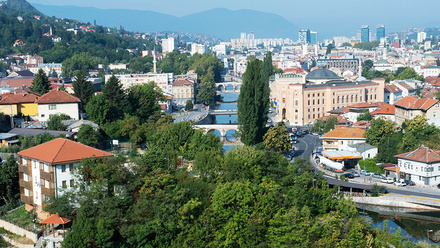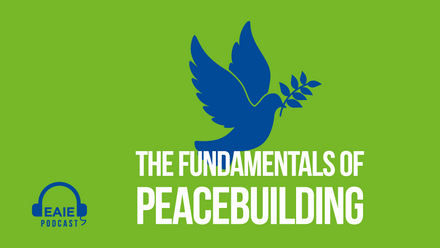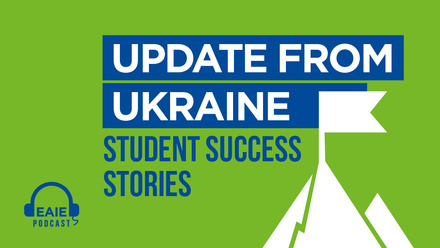The new ice bucket challenge: COVID-19

Wrapping up Forum Week and our reflections on the theme of ‘Resilience in uncertain times’, this post from colleagues at the International Association for the Exchange of Students for Technical Experience (IAESTE) challenges us to learn from the hardships we've faced this year and let them serve as a wake-up call to reconsider how we think about internationalisation.
Remember the ice bucket challenge? This was created some years ago to increase awareness of motor neuron disease, with the aim of encouraging donations for research. The image of throwing a bucket of ice water over the head represents a wake-up call, and parallels can be made with how the world is reacting to the pandemic.
In the case of internationalisation, we are called to react not by donating but by diversifying how we perceive international mobility. The pandemic has heavily affected physical mobility, which is what we tend to envision when discussing internationalisation: students travelling the world. One of the world’s biggest exchange programmes, Erasmus, has contributed to this physical mobility for more than 30 years, with over nine million students benefiting. A huge variety of other programmes offer study mobility, volunteering mobility and exchange internships, managed by universities, non-governmental organisations, non-profit associations or private institutions. Students have an enormous variety of possibilities to choose from.
Acknowledging inequalities
Today, it is hard to envisage starting a professional career without having some international experience; it seems that, in an interconnected world, intercultural skills are required to get a good job, and companies are searching not only for technical expertise but also for soft skills: adaptability, openness, flexibility, teamwork, management and leadership are some of the skills needed to enter the global job market.
It is a sign of progress that alternatives to physical mobility have become more prevalent since the outbreak of the coronavirus
But the idea that all students can experience the positive aspects of international mobility and gain international work experience is a fallacy. Unfortunately, not every student has access to an international experience. The democratisation of higher education is relatively new, particularly in regions outside Europe where, because of different state decisions, physical mobility is less easy for students in difficult socio-economic conditions.
Acknowledging these inequalities is important, and it is a sign of progress that alternatives to physical mobility have become more prevalent since the outbreak of the coronavirus. Moreover, the pandemic is pushing higher education institutions to move forward with the aim of establishing new agreements that can include virtual mobility and Collaborative Online International Learning, therefore diversifying their offer to students who want to get an international experience from home. Virtual mobility is only possible if institutions are committed to implementing it.
A natural path
An increase in distance learning programmes, e-learning, virtual mobility and remote internships seems to be part of a response to the conditions of COVID-19, but this context is just pushing institutions towards a natural path that they were previously reluctant to agree on. The development of IT tools can help to democratise access to international experience. This can also level the playing field in the selection process when a student has physical or other conditions that make it impossible for them to travel overseas.
How can we provide a solution for talented students who cannot go for a traditional international internship because of their socio-economic conditions? What solutions can we offer to include marginal, disadvantaged or under-represented groups, enabling them to exercise the same rights to an international experience? We know that finance is not the only barrier to going abroad. Virtual formats have the potential to become the most popular learning modality for people whose personal situations, such as being parents, make it difficult for them to travel to other countries.
Travel restrictions
Another issue that has not been fully solved in the realm of international internships is visa and travel restrictions (especially in these COVID-19 times). Virtual mobility, remote internships and e-learning programmes can be the perfect solution to include students who find it difficult to obtain visas, adding the value of diversification of destinations.
For instance, a student from Colombia currently has the possibility to do a virtual internship in India. In fact, Indian universities have seen the situation regarding COVID-19 as one of the biggest opportunities for internationalisation. They have found a way to bring the world to their classrooms. Most of their students do not have the opportunity to go abroad for a physical international experience, but institutions now have the chance to offer international courses to their students and to link their students to international companies by using networking technology.
Traditional and virtual options can coexist – both are necessary
In the coming months, more than 10 international interns are expected to be working for some Colombian companies or universities through remote internships managed by the International Association for the Exchange of Students for Technical Experience. “We had to face a global pandemic to turn challenges into opportunities. To understand that connecting the world was already a choice through technology but we were shy to go further,” says Lina Contreras, Director of International Affairs at the University of Ibagué, Colombia.
Filling the gap
The main idea of this article is not to suggest that virtual mobility, e-learning or remote internships are better than traditional mobility but to highlight the fact that traditional and virtual options can coexist. Both are necessary, with virtual options complementing learning scenarios and acting as a response to the imminent need to democratise access to international experience. Virtual solutions are filling the gap that traditional mobility created by being an option only available to a limited group of students. Now, everyone can have the same access.
The crisis created by the coronavirus has presented a new reality. People who work on the internationalisation of higher education are called on to be leaders for inclusion. Today, there are no excuses. Many of us have been working in a remote way ourselves for months.
The world is still moving, maybe at a slower pace than it was six months ago, but technological developments are continuing and we are invited to adapt ourselves to what this new virtual reality can offer. So now that the shock of the ice bucket has passed, let’s rise to this new challenge. Everyone involved in the internationalisation of higher education has an opportunity to build stronger cooperation and meet this new reality head-on.






